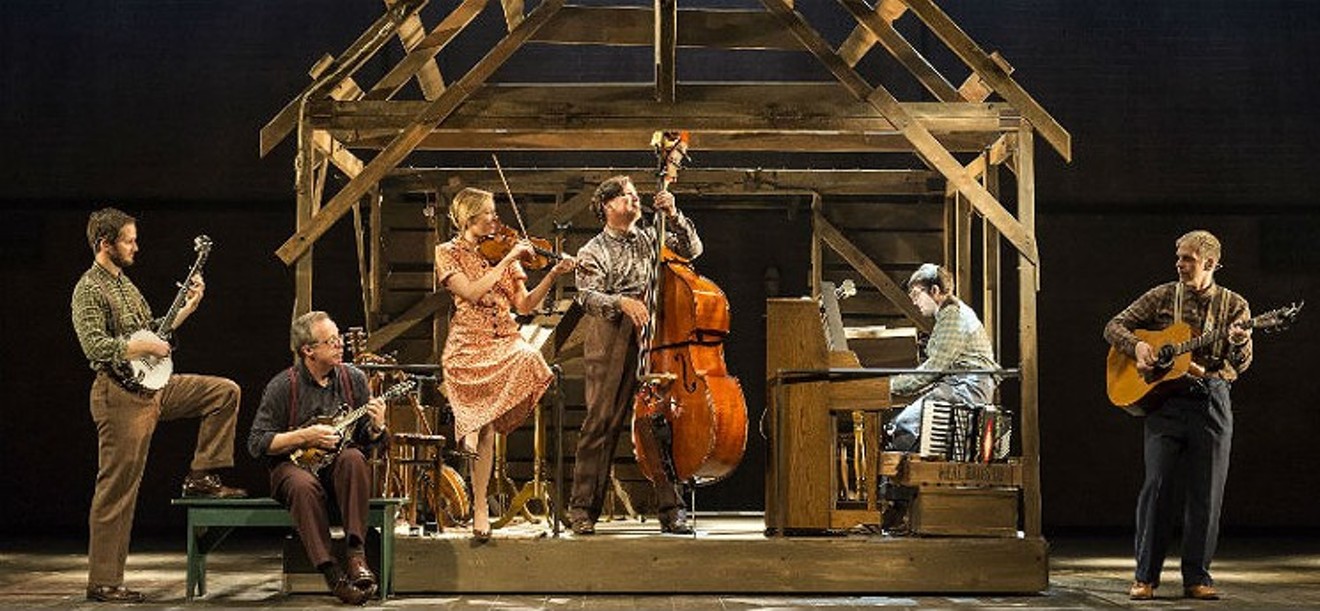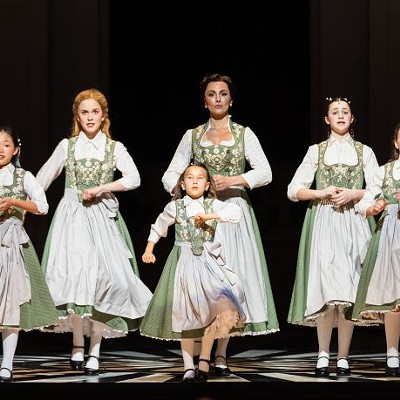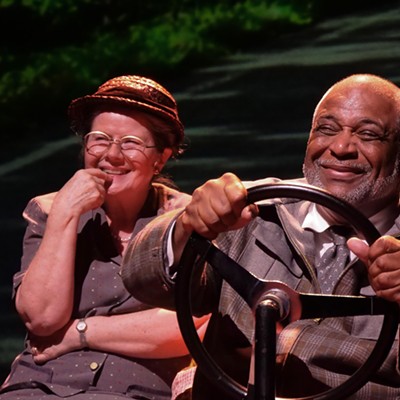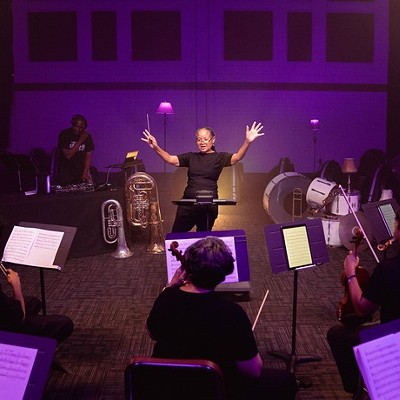Remember the porch swing? Summer evenings when you caught fireflies in jelly jars? Remember a juke joint off the back road with forbidden hooch and hot-to-trot customers? How about misty blue mountains that roll on forever in the background? Sundresses, straw hats, and sensible shoes? Remember teen pregnancy? Eudora Welty? Remember coincidence as plot device? Moses in the bulrushes? Godlike babies in Greek myths left for dead only to be adopted by grateful peasants? Remember the banjo?
Most of these hazy memories are conjured, developed, beaten to death in Steve Martin and Edie Brickell's sweet, sweet “bluegrass” musical Bright Star, playing via Theatre Under the Stars at the Hobby Center.
Okay, there's no porch swing or fireflies, but there are kerosene lanterns and a rough-hewn cabin that houses the very fine band, which careens around the stage like Dorothy's farmhouse in a twister. There is a juke joint, the Shiny Penny, located somewhere on the outskirts of Asheville, North Carolina, where this tall tale is set, and where the randy patrons kick up a rug in Josh Rhodes' ultra-stylized, knee-slapping dances. The Blue Ridge Mountains are much in evidence in Eugene Lee's trapped-in-amber production design and enveloped in Japhy Weideman's smoky lighting. The period costumes by Jane Greenwood are lovingly torn from a vintage Sears catalog.
As for teen pregnancy, yes, that problem is what sets the overwrought plot in motion – the solution is a shocker. The audience gasped at its audacity.
Welty is mentioned in passing, as are Hemingway and Carson McCullers. (Funny, there's no mention of William Faulkner, the South's greatest writer, who would have known how to make much out of all this littleness.) As for Moses and abandoned Greek babies, I'll leave those antique references for you to discover.
Ahh, but the banjo...
The music by Martin and Brickell is non-stop twang, which isn't a bad thing, only too much of the same twang. It's certainly refreshing to hear a Broadway musical go Appalachian. When was the last time you heard an auto harp or mandolin in the orchestra pit? The sound of Bright Star is clean and simple, uncomplicated, time past. But except for tempo, there's not much difference in the uplift ballad “Sun is Gonna Shine” or the tearjerker “Please Don't Take Him.” Looking through the song catalog, it's difficult to remember which number was which. Nothing hits home, nothing stands out.
Brickell's lyrics will win no awards. They're either shoehorned uneasily into the melody or they endlessly repeat, as if saying the same thing three times will increase the song's impact. Generic and bland, the words don't define character, place, time, or motive. And a few numbers fall absolutely flat with flatter lyrics: “A man's gotta do what a man's gotta do, when a man's gotta do what he's got to,” or “I always have, always will, always, always, always will.” For a story that hinges on the craft of writing and editing, these lapses are inexplicable – and inexcusable.
The show may be sloppy in internal construction and a bit too home-spun, but Tony Award-winning director Walter Bobbie (the 1997 revival of Cabaret) spins this Blue Ridge melodrama like a Duncan Yo-Yo. He keeps our interest with a barrage of tableaux vivants, vanishing exits, and that mesmerizing unstoppable farmhouse. The miniature Lionel train that puffs its way across the proscenium trestle is utterly delightful, until we realize what is about to happen to the baby in the valise.
The young leads for this touring production are extremely personable and sing their hearts out. Audrey Cardwell, as young Alice and later her mature avatar, is, first, winning and feisty, then distant and soignee as mature editor of her prestigious literary journal. Patrick Cummings, from the original Broadway production, is definite “leading man” material as Alice's young crush, Jimmy Ray, scion of the community. As innocent writer Billy, Henry Gottfried possesses charm to spare and a lilting tenor to croon Martin and Brickell's country swing; while Liana Hunt, as Billy's waiting-in-the-wings love interest, softly embellishes this standard character with winsome heart.
Although Bright Star didn't set Broadway aflame (playing only three months in 2016), Martin and Brickell's nostalgic fable has tenderness and warmth, wrapped in an inviting, surprising sound. It may not set your heart afire either, but it's beautifully produced and winningly performed. True, it's utterly predictable, but so are those other Greek myths that rely on circumstance and the kindness of strangers. Homer, though, would have loved the banjo.
Bright Star continues through March 25 at 7:30 p.m. Tuesdays, Wednesdays, Thursdays, and Sundays; 8 p.m. Fridays and Saturdays; and 2 p.m. Saturdays and Sundays at the Hobby Center, 800 Bagby. For information, call 713-558-8887 or visit tuts.com. $30-$108.
Support Us
Houston's independent source of
local news and culture
account
- Welcome,
Insider - Login
- My Account
- My Newsletters
- Contribute
- Contact Us
- Sign out

The band got the audience going and got some of the biggest applause of the night.
Photo by Craig Schwartz
[
{
"name": "Related Stories / Support Us Combo",
"component": "11591218",
"insertPoint": "4",
"requiredCountToDisplay": "4"
},{
"name": "Air - Billboard - Inline Content",
"component": "11591214",
"insertPoint": "2/3",
"requiredCountToDisplay": "7"
},{
"name": "R1 - Beta - Mobile Only",
"component": "12287027",
"insertPoint": "8",
"requiredCountToDisplay": "8"
},{
"name": "Air - MediumRectangle - Inline Content - Mobile Display Size 2",
"component": "11591215",
"insertPoint": "12",
"requiredCountToDisplay": "12"
},{
"name": "Air - MediumRectangle - Inline Content - Mobile Display Size 2",
"component": "11591215",
"insertPoint": "4th",
"startingPoint": "16",
"requiredCountToDisplay": "12"
}
,{
"name": "RevContent - In Article",
"component": "12527128",
"insertPoint": "3/5",
"requiredCountToDisplay": "5"
}
]
KEEP THE HOUSTON PRESS FREE...
Since we started the Houston Press, it has been defined as the free, independent voice of Houston, and we'd like to keep it that way. With local media under siege, it's more important than ever for us to rally support behind funding our local journalism. You can help by participating in our "I Support" program, allowing us to keep offering readers access to our incisive coverage of local news, food and culture with no paywalls.
D.L. Groover has contributed to countless reputable publications including the Houston Press since 2003. His theater criticism has earned him a national award from the Association of Alternative Newsmedia (AAN) as well as three statewide Lone Star Press Awards for the same. He's co-author of the irreverent appreciation, Skeletons from the Opera Closet (St. Martin's Press), now in its fourth printing.
Contact:
D. L. Groover
Trending Arts & Culture
- Bring a Friend With You to See A.D. Players' Heartwarming Production of Driving Miss Daisy.
- Reviews For The Easily Distracted:
Boy Kills World - Houston Chamber Choir Brings California Gold To Texas
-
Sponsored Content From: [%sponsoredBy%]
[%title%]

Don't Miss Out
SIGN UP for the latest
arts & culture
news, free stuff and more!
Become a member to support the independent voice of Houston
and help keep the future of the Houston Press FREE
Use of this website constitutes acceptance of our
terms of use,
our cookies policy, and our
privacy policy
The Houston Press may earn a portion of sales from products & services purchased through links on our site from our
affiliate partners.
©2024
Houston Press, LP. All rights reserved.





